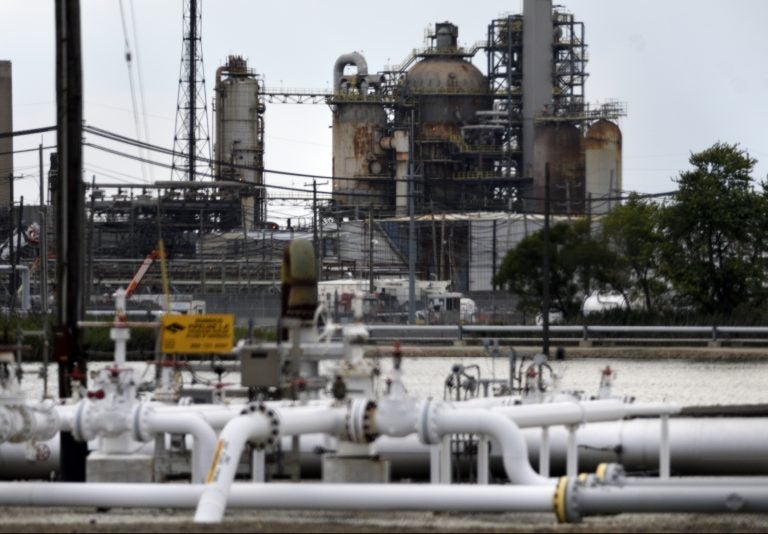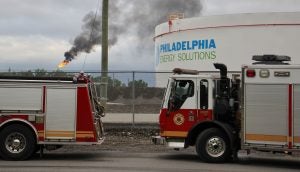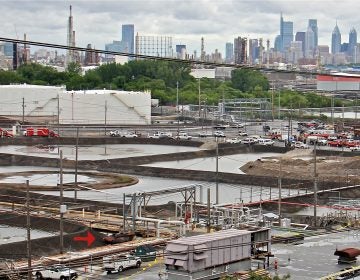Future owner of PES refinery could be decided as soon as January
So far, 15 parties have expressed interest in the complex, though their identities were not disclosed. Philadelphia Energy Solutions may hold an auction.

Philadelphia Energy Solutions Refinery on August 8, 2019. (Bastiaan Slabbers for WHYY)
The future of the Philadelphia Energy Solutions refinery complex in South Philadelphia, forced into Chapter 11 bankruptcy after June’s explosion and fire, could be decided as soon as January. On Thursday, U.S. Bankruptcy Court Judge Kevin Gross approved rules for the sale process.
By Friday, Nov. 22, each party interested in buying the refinery must present a preliminary cash purchase price and state what it is interested in buying, in addition to other required documents, The parties that qualify must then present formal bids to the current owners of PES before Jan. 10.
So far, 15 parties have expressed interest in acquiring the facility, though their identities were not disclosed. Already expressing interest publicly have been Philadelphia Energy Industries, created by former PES chief executive Phil Rinaldi, whom environmentalists dubbed “Fossil Phil;” and S.G. Preston, a Philadelphia-based biofuels company. A representative of United Steelworkers Local 10-1, whose membership includes refinery workers, said nationwide real estate development and investment firm Industrial Realty Group also has expressed interest.
According to documents filed in U.S. Bankruptcy Court in Wilmington, PES has about a week to evaluate qualified bids and identify the highest or best bid that maximizes the sale price and provides the biggest value to the company and its remaining employees. A “stalking horse” bidder may be selected to set a floor price.
PES could decide to conduct an auction, which would take place on Jan. 17 in the New York City offices of its law firm Kirkland & Ellis LLP. The winning bidder would be presented in bankruptcy court at a confirmation hearing on Jan. 22.
A limited objection to the sale process filed with the court last week by the City of Philadelphia was resolved before Judge Gross approved the sale timeline. The city wanted to be “as informed and included as possible” in the sale process, and present and consulted at the potential auction “given the city’s duty to consider the future use of the nearly 1,400-acre site and how its future use will impact Philadelphia’s economy, environment, and public health and safety.” The petitions were granted, and the city will be informed of the identity of any qualified bidders no later than Jan. 17, under a confidentiality agreement.
Judge Gross denied the objection filed by SMART, a coalition of environmental organizations. In court Thursday, Peter Winslow, a representative of the coalition, said the organizations worried that the sale process was moving ahead without any input from Philadelphians.
“The city’s PES Refinery Advisory Group has not yet issued its report. So they’re making their decisions irrespective of what the people of Philadelphia expressed … by organizations, by city government, by anybody what they might be. This train is going fast,” Winslow told WHYY.
“I recognize the concerns that residents of Philadelphia have, it’s appropriate,” Judge Gross said.
He added that he hopes the city’s participation as a consultation party includes the concerns of the community.
Later Thursday, city spokesman Mike Dunn said in an email that the six meetings held by the Refinery Advisory Group had that purpose.
“The advisory group process provided for an extraordinary level of opportunity for the public to weigh in with their thoughts,” Dunn wrote.
The Refinery Advisory Group’s report is due to come out this month. Deputy city solicitor Megan Harper told the court Thursday that the document is “still in the works.”
PES agreed to consider the report if it’s available on time, but said that the process can’t be held up by the report.
Dunn said the report was never intended to influence the bankruptcy proceeding or the attendant auction.
“I want to be clear about the city’s role in this process, which is absolutely neutral. We heard information from all sides (as evidenced by their testimony at six meetings) and we’ll be putting out a report that reflects what we’ve heard from all sides and makes a few recommendations that the mayor and the administration should keep in mind as the future becomes clearer. But we have not been advocating for or against any specific use or uses,” Dunn wrote. “The [Refinery Advisory Group] report won’t prescribe a favored outcome, future use, or favored owner/operator for the refinery site.”
SMART’s Winslow told WHYY that the environmental coalition is concerned about the way the bidding process has been arranged because, by not requiring a remediation to a higher use, it favors bids from the petroleum industry.
PES is responsible for remediating contamination of the refinery site from 2012 to the present. (Remediating earlier contamination is the responsibility of the complex’s prior owner Sunoco, now Energy Transfer Partners.) But Winslow said PES, though it is the debtor in the bankruptcy case, is also a substantial creditor.
“They should clean it up. They shouldn’t pass that onto the next user of the property. They have the resources.” Winslow said. “Our concerns are that the fix is in and that the next user of the property is going to be in the fossil-fuel industry.”
WHYY is your source for fact-based, in-depth journalism and information. As a nonprofit organization, we rely on financial support from readers like you. Please give today.






